Maintaining Multipoint Locking Doors

Ensure the Longevity and Security of Your Doors
Multipoint locking doors are increasingly popular in homes and commercial properties due to their superior security features. With locks engaging at multiple points along the frame, these doors offer enhanced protection from break-ins and better sealing against external elements. However, like any mechanical system, they require regular maintenance to ensure optimal performance and longevity. Below is a thorough guide on how to maintain these complex yet valuable systems.
Understanding Multipoint Locking Systems
Before delving into maintenance tips, it’s essential to understand what a multipoint locking system entails. These systems typically feature three or more locking points, which simultaneously engage when the door handle is lifted or turned. The locking points often include the main latch, deadbolt, and additional hooks or bolts along the edge of the door.
Why Maintenance Matters
Multipoint locking systems are key to your door’s security and efficiency. Proper maintenance ensures:
- Consistent functionality: Prevent stiff mechanisms or misaligned locks that compromise security.
- Prolonged lifespan: Reduce wear and tear by addressing minor issues before they escalate.
- Enhanced energy efficiency: Maintain proper sealing to prevent drafts and energy loss.
Routine Maintenance Tips
1. Regular Cleaning
Dust and debris can accumulate inside the locking system, hindering smooth operation. To clean:
- Use a soft cloth to wipe down the exterior parts of the lock.
- For internal components, employ a dry brush or compressed air to remove dust.
- Avoid using water or harsh cleaning agents that could corrode metal components.
2. Lubrication
Proper lubrication is vital for keeping the locking mechanism smooth and functional.
- Apply a silicone-based lubricant or specialist lock lubricant to all moving parts, such as latches, hooks, and bolts.
- Avoid oil-based lubricants, as they can attract dirt and create a sticky residue.
- Conduct lubrication every six months or as needed, depending on use.
3. Inspect Alignment
Misalignment can cause difficulty in locking or closing the door. Check for:
- Uneven gaps between the door and frame when closed.
- Strain or resistance when engaging the locks.
If misalignment occurs:
- Adjust the strike plates on the frame using a screwdriver.
- Ensure the door hinges are tightened and properly aligned.
4. Check for Wear and Tear
Over time, components of the locking system may wear out. Inspect for:
- Cracks, rust, or deformities in the locking points.
- Loose screws or bolts in the assembly.
- Handle mechanisms that jiggle or feel unstable.
Replace damaged parts promptly to avoid compromising the entire system.
Advanced Maintenance Practices
1. Professional Inspection
While routine checks are beneficial, a professional locksmith or technician can perform a detailed inspection of your multipoint locking system. Annual inspections can:
- Identify hidden issues, such as internal wear or corrosion.
- Provide adjustments that require specialised tools or expertise.
2. Replacing Components
If your locking system shows signs of significant damage or is consistently malfunctioning, it may be time to replace individual components. This may include:
- Worn-out handles or levers.
- Damaged locks or strike plates.
- Hooks or bolts that no longer engage correctly.
Ensure replacements are compatible with your existing system to maintain effectiveness.
Best Practices for Long-Term Care
1. Avoid Excessive Force
Never force the door handle or locks if they resist movement. Doing so can cause damage to the internal components. Instead, investigate and resolve the issue.
2. Protect Against Moisture
Multipoint locking systems are susceptible to rust caused by moisture. Protect your locks by:
- Installing weatherstripping to minimise exposure to rain or humidity.
- Avoiding water-based cleaning methods.
- Applying anti-corrosion spray to exposed metal parts.
3. Use the Locks Regularly
Engage the locks frequently to ensure all components remain active and functional. Prolonged inactivity can lead to stiffness or mechanical failure.
Common Mistakes to Avoid
1. Neglecting Routine Checks
Skipping inspections can allow minor issues to worsen over time, leading to expensive repairs.
2. Using Incorrect Lubricants
Oil-based products can cause dirt buildup, reducing the efficiency of the locking mechanism.
3. Ignoring Signs of Damage
Failing to address visible wear or malfunction may compromise security and lead to system failure.
Conclusion
Multipoint locking doors provide unmatched security and efficiency, making them a valuable asset to your property. By implementing regular maintenance practices, such as cleaning, lubrication, alignment checks, and professional inspections, you can ensure the system operates smoothly for years to come. Avoid common mistakes and stay vigilant for signs of wear and tear—your diligence will pay off in improved safety, energy efficiency, and the longevity of your door system. Proper care is not just an investment in your security but also a guarantee of peace of mind.
Should you have any questions regarding the above, please do not hesitate to contact me.
Locksmiths most commonly asked questions:
The questions that, as a locksmith, I am most commonly asked are here with my answers
Do Skeleton Keys open all locks?
A key to open all locks is only found in magical fantasy. Even us locksmiths need many different lock picks for the different types of locks we come across, so that hero you see on the TV who carries a few needle like implements in a little pouch, is only making a small representation of what is really needed, and even then, the speed shown would be for very easy, smooth running locks. That being said, each lock type and brand have a finite number of combinations and if you were to try your house key in enough other houses using the same brands and lock type, you will find houses that you can enter with ease. This is an important point when moving into a newly built home on a large estate. The average new house comes with front, back and patio doors. A 500 house estate means around 1500 locks and the developer will use the same brand and lock type on every one of them. Locking doors to garages and sheds could easily make that 2,500. With that many locks, the statistics say there is an extremely good chance someone else’s key on that estate will fit your lock. So, it is very good advice to change your locks, even on a new home, preferably to a different brand to all the rest.
How will the locksmith gain entry?
There are many ways to bypass a lock. You might even want to see for yourself how it is done. Please do not be offended if the locksmith asks you to step away while he works. Some techniques require a learned feel or special technique. Watching the locksmith work can show people how to get into other people’s homes which is not really a morally good thing. Also, watching the locksmith and trying to replicate what they do next time, might lead to bigger complications and an even bigger bill. Besides, if they are given room to concentrate, they can work faster, getting you in quicker.
Why do locksmiths charge so much?
Hopefully, you only see the locksmith for a very short time. What you don’t see are the endless hours driving between jobs. It is very that two people have an emergency next door to each other and usually the case that a locksmith will criss-cross his patch several times in the same day. In cities the patch may be small but the traffic will be horrendous and rurally, the patch is much bigger due to lack of population density. On top of that, locksmiths need to keep up with the latest changes in law and products, keep on top of their own accounts, maintain their vehicles, replace tools and nowadays, write blogs! There might be additional training programs. This doesn’t just mean the cost of the course itself, but losing however many days work the course entails. Then there is the time spent ordering parts online or time spent in shops purchasing tools, etc. As a cost example, I have to do two jobs a month just to pay for the chisels and drill bits I will need to replace each and every month. So you can see, there is a lot more cost involved than just the time the locksmith spends with you.
If I have my locks changed, how many keys do I get and where do I get more cut?
Most locks come with two or three keys. If you are booking a lock change for a future date, it is wise to get the number of keys you require ordered with the lock. This way, you can guarantee the keys will have been tested in that lock before they get to you. Some locksmiths can cut keys on site which again is a sure way to see they are tested. The alternative is to go to your local engraver/cobbler who will usually provide key cutting services. But here you are chancing your luck, because you will have to wait until you get home to try the keys and if they don’t work, you have to go all the way back to the shop again, still with no guarantee it won’t happen again. Chances are, key cutting outlets will not use genuine branded blanks either. You might think chain key cutters would be the best option but these have high staff turnover and very basic training. Every time I have been recalled to a faulty lock that I have installed, the problem has been poorly cut keys from chain stores. If getting keys cut, always ask for genuine branded blanks that should show the same brand name on the head of the key as the one you getting copied. Many will tell you the non-brands are just as good, but this just isn’t so. Demand genuine. Leave a deposit and pick up the keys a couple of days later if needed. This could save you a much more pricey second visit from the locksmith. Never use an already copied key to cut another. If you have lost your original keys, get a new lock an order the appropriate number of keys with it.
What is British Standard and why do I need it?
British Standard or BS3621 is a rating for the effectiveness of locks against certain attacks that includes, picking, drilling, slipping, bumping and a whole host of other terms you might not be familiar with. Your home insurance will demand your locks on wooden doors be up to this standard. While it is not an insurance requirement for doors where you have to lift the handles before locking, every locksmith will correctly tell you that you should a BS3621 lock on these doors as well because without them, the intruder can enter your home in under 60 seconds with no power tools. Even if the intruder does get in through a BS3621 rated lock, your insurance might not pay out if another door on your house is not up to standard, so check now that all your final exit doors have a BS3621 kite mark.
What is a fair price for my locksmith?
This is a bit of a minefield. The nationals will charge more because they have to make their profits, pay office staff and pay the locksmith they sub-contract to do the work, but they will do the work that saves you ringing several people in an emergency, and many local locksmiths rely on the work that comes in from the nationals while they get themselves established. That aside, locksmiths seem to have a standard rate, evening rate and through the night rate, plus weekend rates and bank holiday rates. If possible, you should check the locksmith’s website to see if they have any indication of what you might expect to pay. Personally, I have one rate no matter what time of day of what day of the week it might happen to be. But if you have the time, you should ring two or three locksmiths. The cheapest one will probably be the least experienced or hiding costs until he gets there. The most expensive one will be over pricing and you should usually go with the one in the middle, especially if these prices are wildly different. Be sure to get quote on the phone, a revised quote once the locksmith has visually assessed the job, and find out if the price includes VAT. You also want the locksmith to inform you if anything happens that will cause a price increase. The locksmith should tell you about any potential price increase reasons before continuation.
How long does it take the locksmith to open my locked door?
This can be seconds to a very long time. Locks are often worn, rusty or might have something causing a jamb. The locksmith is wary of damaging your door so will take time and care to make sure the job is done quickly with the least amount of damage. A simple latch lock might be opened in seconds, but a seized multi-point locking system can be very difficult to open without causing damage to the door. Rest assured, the locksmith wants to get you in just as quickly as you want to be in yourself. With car locks, the picks require feel of springs inside the lock itself. If the lock is old, this feel can be difficult, or if the internal workings are too loose, the individual parts can keep passing beyond their opening point, making a three minute job last an age. Patience is your only requirement.
Why do I need to pay on the day?
You are paying for a service and often new products. Most locksmiths are sole traders and unable to run back accounts like big companies. The costs of materials and van/tool maintenance keeps thing tight all the time. We just cannot add tracking who owes what where and when all the time in addition to everything else. Now that doesn’t mean we are heartless and unsympathetic to those who just don’t have the means to pay in an emergency situation. If you genuinely cannot pay on the day, make the locksmith aware before work commences and something can usually be worked out, but be aware, should you not pay the locksmith within an agreed time, he may well charge late payment fees or you might just find yourself paying more should you need that locksmith in another emergency.
So, there you go, the locksmiths most commonly asked questions !
Smart locks & British Insurance standards
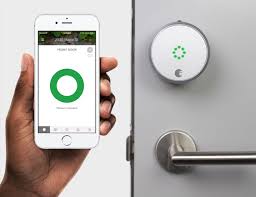
Smart locks are not exactly a new idea. They have been around for a good while now, but some operate on a latch type system built with the American customer in mind. It has been hard to find smart locks that meet British Insurance Standards and do not reduce your overall security.
The trouble with latch type locks is that there is an effortless way to bypass them called “slipping.” Unless you have an auto deadlocking latch with a British Standard Kite mark, your door should always have a second lock with a bolt that throws when you turn the key. Or you can have a mechanism that throws out all sorts of hooks and bolts when you lift the handle, and these have been especially hard to get decent smart locks for. You have been able to get handle sets with codes and proximity tags, but these have been expensive, work with limited mechanisms and prone to break downs.
So, I have been quietly watching a couple of brands for a couple of years. I have fitted these smart locks hesitantly keeping prepared for any early development issues. The wait has been worth it because the brands have improved quality and flexibility.
We now have smart locks that will work on all doors. UPVC, Wood or metal doors. You can open your doors via an app, a keypad, a fob, or your smart speaker.
Think of a disabled person who wants security but needs care. A combination of smart doorbell and smart lock linked to your favourite assistant device means the door can be locked, they can see who is coming to the door and decide whether to open it or not all without having to get up. If they have a fall, their emergency contact can open the door remotely, meaning ambulance crews do not have to wait for a locksmith to come or must smash a window to get in.
Keycodes
Holiday let owners can change keycodes more often, giving cleaners and workers secondary codes and guests a code that only lasts the duration of their stay. This can vastly reduce the situations where guests lose keys or lock them inside the property.
Landlords who really should change the locks with changes of tenants, can now simply change the code.
Small businesses can install locks and not have to worry about staff who leave and keep hold of keys.
There are many reasons to have smart locks. If you are interested, I can tailor a set up to your needs. There is no cost for a consultation and never any hard sell. Simply give me a call, send a text or an email. You can find the details of contact on my home page.
Thanks for reading.
Locks; spend to save. A little spent now – in time & money- can save you a lot more of both in the future.
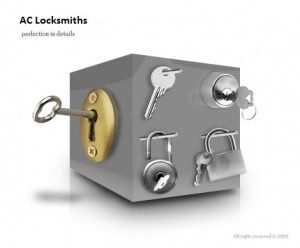
Do you have multi point locks? These are usually on UPVC doors or composite doors where you must lift the handle before locking. Increasingly, they are found on wooden doors as well.
Many of my call outs are to jobs where these have failed and the customer says to me something like; ‘I knew it was getting difficult, but then it just wouldn’t open.’ What happens then is I get the door open and must replace parts of the mechanism or the whole thing, depending on brand. The minimum part cost is £80, but it can go over £200. The sad thing is that in most cases, this cost is avoidable. It might be a case of re-aligning the door, servicing with a good oil or graphite, or clearing wasp cells (wooden doors).
As a rule of thumb your handles should be as easy to lift when the door is shut as they are when the door is closed. You can do the servicing yourself; All you need to do is firstly give the door a good clean all around the edges. Make sure all the holes in the frame are clear of debris, especially if you have a bolt that goes straight down. The holes for the bolt often get stones in which putt excess pressure on the mechanism.
Once everything is nice and clean, look at the front edge and lift the handle up and down a few times to see all the parts that move. You need to lubricate these moving parts twice a year. Best way to remember is do it when you change the clocks. Now push the handle down and hold it. The latch will have retracted and because it is wedge shaped, you will see a gap big enough for your lubricant straw. Push the straw in, squeeze for a few seconds and then work the handles up and down a few times to get the lubricant to all parts inside.
This is especially important if your home is near the sea as sea salt is very harsh. If you own a static caravan and the site management do not service doors for you, you will either need to make time to visit or invest in the services of someone who knows what they are doing.
If your mechanism is still difficult to operate when the door is closed, even after oiling, then you will need to think about door alignment. This is common in conservatories, and anywhere prone to ground movement. Some doors are easy to adjust, some are not, and old doors might need a hinge or two replacing. Look at your hinges. If all looks straight, then small adjustments might be needed. If you can see obvious buckling, then get the hinge sorted by a professional before it breaks the more expensive mechanism.
Even if you are a handy person yourself, finding exactly where the door needs adjusting can be daunting. I came across one I had not seen before in Docking the other day. It took a long time of trial and error to identify the part that was causing the problem. In this case the door itself had warped and while adjustments could be made, the customer had to accept that a part had to be removed completely to avoid having to buy a whole new door.
If after all this, your mechanism is still stiff, then there is something wrong with it. Floppy handles are another good indicator. You now have a choice. Get a professional locksmith in to change the mechanism while the door can be opened and he can get to everything easily or wait for it to go clunk when you have an important appointment and find he has to snap the cylinder, drill the handles or damage the door frame, all of which cost more to replace and fix.
These things happen always at the worst times. I remember at the height of the ambulance delays; an older customer in Holt was locked out because of lock failure. It was icy cold and slippery, as always, I asked if there was external power and so he started towards his garage which he had a key to and slipped over onto his back that had only recently been operated on.
The poor gentleman then had a three hour wait on cold ice while we waited for an ambulance. I couldn’t lift him myself for fear of doing more damage. The lock went at precisely the worst time possible and could have been avoided had the customers addressed the issue sooner. So next time you visit a vulnerable person, please do check their doors for them. Many think the issue is just that they are old.
One of my favourite things is seeing the look on someone’s face when they can suddenly easily use a door they have been struggling with for ages. But don’t call someone like me straight away. Just today, I returned to a lady in Walsingham who was having difficulty with her door that I had adjusted only recently. She showed me what she was doing, and I worked out she was just getting a little muddled with the operation. A quick lesson and write down of instructions and she was good to go again (no charge).
I know budgets are tight for many, but checking your doors now, might just save you a packet in the future – and checking on a vulnerable friend might save them more than just money.
Should you have any questions regarding the above or any other lock issues, please do not hesitate to contact me for a free consultation.
Lock changes for landlords
If you own a holiday let property, you should be well aware of the new fire regulations that suddenly hit last summer. I know many of you have been spending all your profits to ensure your properties are up to scratch for the coming season.
But what about long term lets?
The fire risk assessment to be carried out by holiday let owners states; ‘any property you pay to stay in. ‘If that doesn’t already mean long term lets, then it certainly will if the government of the day decides that the measures taking place with holiday lets are a success. After all, the more they make you spend, the more they get in tax.
If you own properties that you let out to tenants, then it might be an idea to get ahead of the curve. Lock changes for landlords; locks are changed all the time through abuse, lost keys, evicted tenants etc. What better time than now to make sure that the new locks going in are keyless escape versions. In the event of a fire, your tenants can get out quickly without having to find keys in a panic situation?
AC Locksmiths Norfolk can change your locks for you. Replacements are kite marked products. All insurances will be valid.
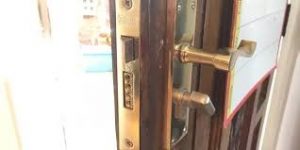
But while thumb turn (escape) locks are great for getting out easily, they can be a reduction in your security. There are tools that can go in through letterboxes and rotate the inner thumb turns, it is important to consider options to cancel this short fall. Letter catching cages are a great remedy to this, or mounting a post box outside your house, while disabling any door positioned letter plates is even better.
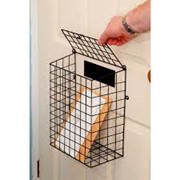
Changes are coming. I have spoken to several holiday let owners who have changed locks recently, only to have to change them again in light of the new legislation. It’s worth thinking about being ready for the inevitable.
Any questions regarding the above, please do not hesitate to contact me through any of my contact methods. https://www.ac-locksmiths-norfolk.co.uk/contact-us-here/
Thanks for reading.
A day in the life of your friendly neighbourhood locksmith
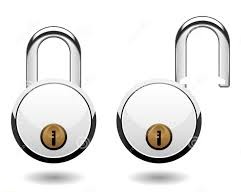
Just recently I had a call from a gentleman looking to start up as a locksmith in another county. He wasn’t going to be my competition, so I thought I’d take five minutes to answer his questions and give him some advice. Half an hour later, we were still talking and I had only scratched the surface. Being a locksmith in the UK is hard compared to other places.
From what I read of American locksmiths, their locks are pretty easy to pick but they are pretty standard, so locksmiths tend to re-key locks rather than replace the whole thing. That means they are used to dealing with the same locks day in, day out. Re-keying is where you take out the old pins, put new ones in, using a different configuration and cut keys to match. Across as much of Europe as I have been, the locks are usually euro cylinders, the type we see most commonly in UPVC doors. These are everywhere, and again, pretty easy to get through if you know what you are doing and have the correct tools.
But here is the UK, you never know what sort of lock you are going to find. Nightlatches (Yale locks), mortice (Chubb) locks in 2, 3, 5 or even 7 lever varieties, Rim locks mounted on to one side of the door with a long key, wooden doors, metal doors, composite doors, hollow doors, upvc doors and on and on and on. UPVC doors have in excess of 37 mechanism manufacturers, all whom produce multiple designs with multiple sizes of those designs. To be prepared for any situation, I would need to go to every job in an articulated lorry! If you ever think of going into this business, you must be prepared to learn a lot on the job. Even now, I am coming across things I have never seen before in over 13 years on the job.
So what is my day like? Unlike city locksmiths, being one of the few Norfolk locksmiths, my area is huge. Norfolk has quite a sparse population well spread out and with a notion that we are a ‘safe’ county. That means I can drive for up to an hour to reach my jobs. Admittedly, I do try to keep local, but right now, there is a massive shift in holiday let fire regs and I am racing across the North Norfolk coast fitting thumb turn locks for all those that need keyless escapes. That means from my base, I travel all the way to Hunstanton in one direction and as far as Happisburgh in the other. I will go further, but this is my main focus.
So, Monday means getting to the first job for 9. Mondays are always busy so this will be booked from last week. By the time I finish the first job, I’ve been interrupted by two more bookings and two or more advice calls. With something unexpected happening at the first job (customer not there because they decided to walk the dog and leave me waiting for half an hour, I am already late for the second job. But one of those calls I just received is from someone locked out with desperate need to get back in and pick up the CV they need for their job interview. They are also on a large divert from a direct route to my original second (now third job). With no time to put anything away tidily in my van (my wife never believes that), I hurry to the lock out. Five minutes away, I get the call that the lockout has found a neighbour with a key and they don’t need me. So now I am really late for the second job and have nothing to show for it. Luckily, when I get to the second job, it is really easy for me and I am away in fifteen minutes, catching up time, but not enough to keep my van tidy (honestly, wife!)
The third job is a long distance one, so there and back is nearly three hours. Unfortunately, I need to order parts, so apart from getting them secure, there is not much to do. That’s three (nearly four) visits and only two have resulted in me getting paid today (I don’t usually charge if I can’t do anything). I then come home. I have a backlog of paperwork to do, parts to order and a van tidy to ignore (tomorrow when the weather is better!) During this time, more calls come in and more appointments/queries need to be addressed via email. But Monday is my favourite day. I play football on a Monday night so it is the one time I can switch off. I have been known to go to jobs after playing 5 aside football, but now I ache too much. Any other night I am ready to go when the phone rings. This last week it was Friday and Sunday nights, but luckily on both, I was home by 11pm, so in bed ready for the next day. Tuesday is likely to be more easy jobs like measuring up for thumb turn locks, because I am a wuss with the football (maybe next day for the van tidy!). But the emergencies come in anyway and I can only hope for the long drives in between!
99% of people understand that locksmiths are different to most other traders. We don’t often get big jobs like builders. Most of our time is in between jobs. So when we turn up and get you inside your home in five minutes, the money you pay is for the time to get to you, to return home, the fuel, wear and tear on the van, the time advertising, doing paperwork and eventually tidying the van!
Holiday let owners – are you aware of holiday let and keyless exit point regulations?
In light of the new self assessment fire regulations for owners of holiday lets, here are some things I have noticed people getting wrong:
Firstly, your front door and back door may not be the only fire escapes. If you are in a room with French doors and the fire is the other side of the interior doors, then the French doors are your exit point. Every final exit door is a fire exit and therefore every final exit door must me converted to keyless escape.
Secondly, if you have a porch, the inner door must either be converted as well or left unlockable by the customers. This can be as simple as taking away that key. Alternatively, convert the inner door and remove the key for the outer porch. Either way, the entire route must be keyless escape to meet the keyless exit point regulations.
Finally, this conversion is a serious impact on security. There are tools available that can come in through the letterbox and rotate the thumb turn/push the lever. As these are your holiday lets, I doubt you get much worthwhile mail, so either invest in a letterbox guard, letter collecting basket or seal off the letter box and put a posting box on the wall outside.
So what does the conversion to keyless exit point regulations consist of?
Well, if you have a door with a lift handle mechanism then it simply means changing your double key cylinder for a key and turn cylinder
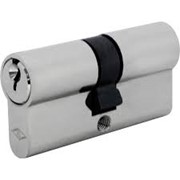
Double key cylinder
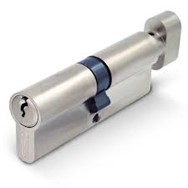
Key & turn cylinder
Prices start from £55, although I see no reason to go for high spec when you are making life easy for the burglar under these new regulations.
If you have a wooden door, you are turning this 
 into this
into this
On wooden doors, you also have the option to install a kite marked nightlatch /Yale type lock
If you need me to come and do a keyless escape conversion for you, please book a free assessment/measure up where I will give you a final no obligation quote and book you for fitting at the next convenient date. Most work can be carried out during changeover days.
It’s that time of year again when the weather starts to do funny things to our doors. I am already being called out to do jobs that could be avoided with some basic maintenance for your locks.
Here on the Norfolk Coast, locks are not only at risk of rusting, but also damage from sea salt and wasps (more on those later).

So what can you do to avoid having to call me, or at least make the call a bit cheaper?
Firstly, keep your door (and window) locks clean. It’s very easy to forget about the front edge of a door when it is shut while you clean, but I see some shocking sights in my work. The more dirt and dust is allowed to build up, the more it finds its way into the working parts of your lock eventually causing damage.
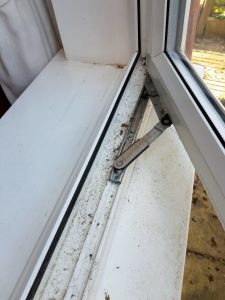
The next step is oiling your locks. There is a lot of argument in the locksmithing world as to whether WD40 or graphite is better. For me, I say WD40 used twice a year (every time you change your locks is an easy way to remember and perfect for changes in weather) works just fine because it coats and flushes at the same time. Oiling does not mean just squirting a bit of oil where you put your key in the lock. If you have a wooden door with a mortice (“Chubb” type) lock, then the part inside stops the oil getting to where is needed and if you have a lock with a “Yale” type key, then oil in the key way is only getting a tiny percentage of what needs to be oiled. If you have any lock with a latch, either pull the handle down or rotate any lever knob to retract that latch. If you look where the latch retracts, you will see that the wedge shape of the latch will create a perfect gap for you to put in the straw provided with cans of WD40. Squirt for about 5 seconds (10 seconds if first time) and then work the handles, etc a few times to get the oil all over the insides.
On doors with multipoint locking systems (eg UPVC doors) you should also look at the front edge and lift the handles up and down a few times. Give another squirt of oil to anything you see moving. When you do this, you might even find the sticker that tells you to oil the door that you never knew was there and the installer never told you about! If you have a wooden door with a single deadlock, unscrew the faceplate at the front and take it off. This will now give you a larger gap around bolt. You might have to hold the WD40 straw in one corner, but squirt what you can, being aware you might get some splash back at you and oil does not clean up from clothes easily, so no maintenance in your wedding dress/designer suits. Don’t forget to put the face plate back on afterwards. In all cases, put some rags on the floor as oil will run down and drip off the bottom of the door and WD40 even stains paving stones.
Once you have done all the above, keep an eye on how difficult your door is to open. Hotter summers are warping even doors that never recognisably warped before. If your door is becoming difficult to operate in any way, there will be undue stress on various parts of your lock which will eventually lead to something breaking. The most common problem last year was French doors shrinking away from each other and the hooks of the multipont mechanisms not being able to get into their slots. Multipoint mechanism doors are usually adjustable, if your door is not as easy to operate when closed as it is open, best get the door adjusted before something breaks and you will have to add a locking product on to the cost of the adjustment.
Finally, those pesky wasps. If you have a wooden door with a multipoint locking system (lift the handles to lock) and it does not have top and bottom bolts, there will be a gap at the top behind the metal faceplate. This gap runs down behind the faceplate as far as the first moving part you can see. It is the perfect size for wasps to make cells in which to grow more baby wasps. Those cells harden a lot and can cause the mechanism to break. My advice is to at least put insect repellent all over the top of the door and then maybe stick a small cotton wool ball just in the top to bar access. I’ve dealt with a few of these cases now, and I really don’t like angry wasps trying to get me while I destroy their hard work!

If you have any questions regarding the above information, please don’t hesitate to get in touch by phone, text or email.
Thanks for reading.
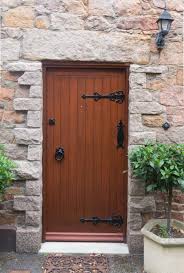
New laws for holiday lets; Very soon, all holiday let properties are going to be required by law to be keyless exit in case of emergencies. For properties with UPVC or similar doors where the handle needs to be pushed up before locking, the lock changes are straight forward and the existing cylinder just needs to be changed for one that has a thumb turn on the inside rather than a key.
But if you have a wooden door with a mortice (Chubb type) lock, then you will need a complete conversion kit consisting of replacement lock case, thumb turn cylinder and Euro cylinder handles. Most of this is straight forward, but sourcing handles to match your existing ones can be a drain.
If you do not get this work done and your tenants have an emergency, there will be no cover from your insurance should the worst happen due to them not being able to escape.
Here at AC Locksmiths Norfolk, we are happy to work around your changeover days and with your management company to get the locks changed seamlessly without hassle for you or your customers.
Should you require any more information about the new laws for holiday lets – or anything else, please contact me for an informal chat.
It is well known that business properties, especially where the public has access, should have secure fire exit doors, which means that all locked doors should be able to be opened from the inside without a key.
But many people renting out properties for holidays do not realise that these fire exits should have easy escape capabilities. The logic behind this is that if the lock is key operated on the inside, the customers may well lock the door, put the key somewhere safe, and then should the worst happen and a fire break out, in their panic and being away from home, they could well forget where they have put the key and be caught in a tragic accident.
So if your wooden door has a nightlatch (often called a ‘Yale’ lock), and that lock has a British Standard Kite mark, you are fine.
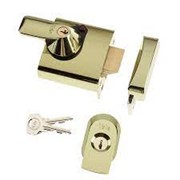
If your wooden door has a mortice (often called a ‘Chubb’ lock), with key operation on both sides, there is a conversion that can be done to use a Euro Cylinder that has a thumb turn on the inside. This means changing the lock and handles but can use the existing space with minimal visible change.
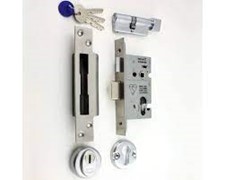
If your door is UPVC or has any mechanism where the handles must be lifted before locking, it is a simple matter of swapping the existing Euro Cylinder for one with a thumb turn on the inside.
This is a key both sides Euro Cylinder: 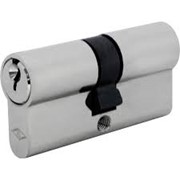
And this is a standard thumb turn Euro Cylinder: 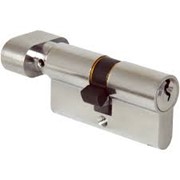
There is a slight worry with installing these fire escape systems, though and that is I have a tool that can go in through letter boxes and turn the thumb turn allowing me access to the property. We have two solutions. Firstly, certain thumb turns on the very best cylinders are designed to be difficult for tools to turn. They might require a push while turning or just plain difficult for the tool to purchase.
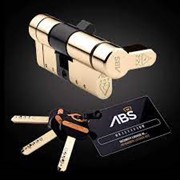
Alternatively, you can buy specially designed sloped guards for your letterbox (although even these can be bypassed with ever more clever locksmith tools).
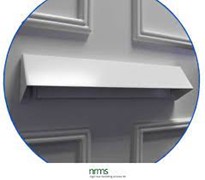
Or better yet a letter catching cage on the back of your door will stop all tools that I know of at time of writing.

If you own or run holiday lets, you might find your public liability insurance does not pay out if you have not taken the correct measures to ensure the safety of your guests.
I am noticing a lot of village halls are also suddenly finding out from fire inspections that they are not up to scratch. Please check the regulations specific to you if you run any property that is not a private home.
Click here for Government guidance on fire doors/fire safety
Should you have any questions regarding the above information, please do not hesitate to contact me.
Thanks for reading.




















